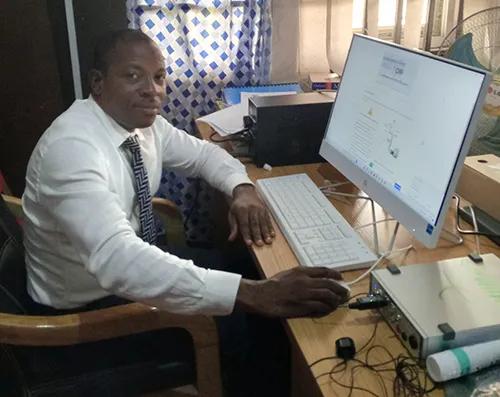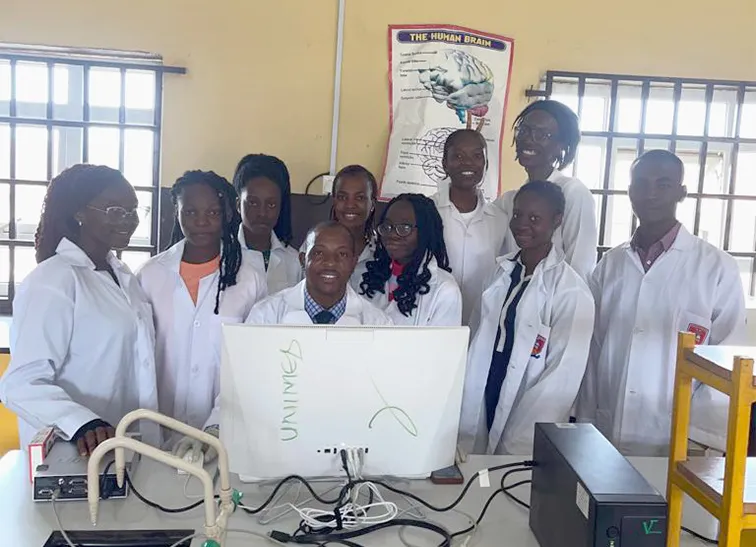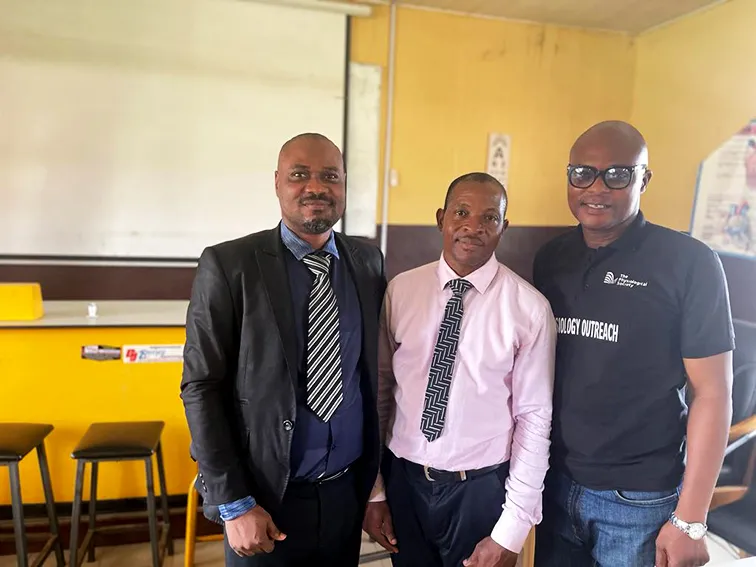
Johnson Olowe, FISLT, is a pioneering Assistant Chief Technologist at the University of Medical Sciences (UNIMED), Ondo, Nigeria, where he taught physiology to 200- and 300-level students. Originally based at the College of Medicine of the University of Lagos, Johnson is improving physiology education for students in Nigerian universities by developing and sharing his knowledge of the PowerLab and Lt LabStation systems.
As the first laboratory scientist to use Lt LabStation in Nigeria (since UNIMED is the first university in Nigeria to purchase LabStation), both lecturers and laboratory scientists look to Johnson to share his expertise with the platform. Here, we spoke with Johnson about his teaching journey, the challenges he sees in physiology education, and how PowerLab and Lt LabStation have helped him overcome these issues and engage students in active learning in the classroom.
A love for the laboratory
From a very early age, Johnson has been passionate about innovation and tackling challenges. Choosing to study science in high school and engaging in chemistry, physics, and biology practicals led to a course in Science Laboratory Technology at the Obafemi Awolowo University, Nigeria.
He says, "I have always loved to work in the laboratory, exploring and creating new things."
By specializing in Physiology/Pharmacology techniques, Johnson was able to focus on his passion for medical science and improving health outcomes. When on sabbatical appointment at UNIMED, Johnson used PowerLab to teach 200- and 300-level physiology practicals, and has returned with this knowledge to the University of Lagos.

Johnson Olowe using LabStation and PowerLab.
He hopes to simplify the practical lab process and make learning fun for students: "Teaching is part of me, and I believe that there is nothing difficult to understand. I naturally feel good imparting knowledge."
Training future healthcare workers and scientists
The most populous country in Africa, Nigeria is home to 230.8 million people, but does not have enough doctors to meet demand. Only 24,000 licensed doctors serve this large population (or 1 doctor for ~10,000 civilians). For this reason, it's vitally important that medical colleges in Nigeria are well-resourced and produce numerous, highly-competent graduates.
Johnson uses LabStation to teach students who are in training to be doctors, dentists, physiologists, nurses, physiotherapists, and laboratory scientists. To understand key physiological concepts, students participate in practical sessions to see theory in action.
Previously, Johnson would use multiple different pieces of equipment to demonstrate the functions of different body systems - including a polygraph, kymograph, and spirometer. This wasn't a simple way to teach, and he soon transitioned to LabChart (ADInstruments research software) and PowerLab: "LabChart replaced the functions of a number of pieces of equipment (kymograph, polygraph, spirometer, and vitalograph). In addition, it has made our practical sessions neater and safer - unlike the previous equipment which uses ink, which is believed to be carcinogenic, and is also messy as it soils the laboratory, including lab coats."
Having become familiar with LabChart, LabStation was an easy next step. Johnson says, "PowerLab with LabStation is laboratory-practical-made-simple."
"Where subjects are needed, students volunteer...while the results are projected on the screen for a larger view. Practical sessions have been fun with LabStation."

Johnson with his students in the lab.
Combining experiments with reflection
It’s important that students know the meaning of the data they’re producing from their experiments. A deeper understanding of these core physiological concepts will build a strong clinical foundation for their future practice as healthcare workers, and contribute to better health outcomes. To make sure students get the big picture, Johnson makes use of the pre-made questions in LabStation.
Questions at the start of the lesson benchmark the students knowledge and are an opportunity to eliminate any misconceptions they might have before undertaking the experiment. Additionally, “there are also questions provided along with the practicals to test student’s assimilation of the physiological concept being taught. This has made lessons in LabStation a wonderful experience for the students."
Related: Free Download: A Guide to Transforming Traditional Undergraduate Science Education »
Immediate feedback is also important to reassure students that they are learning effectively. In LabStation, “there is room for the students to check if the answers they provided are right or wrong. Where the answers are wrong, the correct answers are provided with explanations.” This means that students can receive feedback without waiting for the teacher, who can often be very busy in a large classroom.
Tackling challenges in physiology teaching
A fix for equipment failure
Historically, the main challenge Johnson has found during teaching in the classroom is when equipment malfunctions. For example, “Sometimes the instructor would have told the students that they will see a response following stimulation with an electrode, only to realize that the electrode had refused to stimulate.”
“The disappointment would be glaring on the faces of the students. In order to mitigate this challenge [when we were using the old equipment], we had to record some of our experiments to show students whenever the equipment failed to work.”
“However, with PowerLab and LabStation such a challenge does not occur.”
Extra support for educators and students
Johnson has found that teaching has been smoother with Lt LabStation:
- Scaffolded lab protocols: “LabStation contains detailed instructions on what the educator has to do to get results. The lessons are well-structured and organized.”
- Comprehensive curriculum: “I like the fact that LabStation has captured almost all practicals in Physiology and in other departments of learning such as Biochemistry, Biology, Neuroscience, Psychophysiology etc.”
- Preliminary material: “The educator does not need to worry about [the] pre-lab talk; the lessons already have that in LabStation.”
- Videos of hardware setup: “Videos are provided to demonstrate how the connections are to be done, so everything in PowerLab and LabStation is made simple.”
- Personalized educator support: “Maero (ADInstruments African region Distributor Sales Support) took time to respond to all my questions which really helped my inquisitive mind to understand how LabStation works. I am grateful for his patience.”
By combining content, assessment, and data acquisition into one system, Johnson feels that he can save time: “I like the ease of use; the package is user-friendly. These features have made PowerLab a one-size-fits-all kind of tool.”
This satisfaction is reflected in the student feedback too. Reflecting on his recent classes, Johnson says, “The students are excited about the preview questions which test their knowledge in the subject area.”
“They are also excited about the series of experiments available in LabStation. The students look forward to the practical day and they are always willing to act as subjects for the experiments. The experience indeed has been gratifying.”
“Training the students with PowerLab in UNIMED was a lot of fun.”

Pictured with colleagues (on the left, Dr Victor Emojevwe - Acting HOD, while on the right is Dr Adeniran Akinola, immediate past HOD), Johnson recently shared his work with Lt LabStation and PowerLab during a workshop at UNIMED to celebrate World Physiology Week 2023.
The importance of technology in teaching
Johnson is a strong advocate for edtech. “My advice for educators looking to use PowerLab and LabStation is that they should not delay in purchasing units, because a trial will definitely convince them. It is like someone who has been driving a manual car - the moment they drive an automatic car, they won’t want a manual car anymore.”
“Nothing makes teaching practicals easier than PowerLab and LabStation.”
Improving education for more students
In the future, Johnson sees a key role for PowerLab and LabStation at UNIMED. “I see PowerLab and LabStation becoming indispensable equipment in every laboratory in the Faculties of Science, Basic Medical Sciences, Clinical Sciences, and Pharmacy.”
“The staff of the Department of Physiology are enthusiastic to explore…On a daily basis they come around to get more conversant with the use of PowerLab and LabStation, and I am always eager to assist them accordingly.”
“Some staff from the Biochemistry and Pharmacology Departments have also indicated interest in exploring and deploying PowerLab and LabStation for their practical sessions. In UNIMED today, PowerLab and LabStation are the talk of the town."

Johnson Olowe, FISLT,
Assistant Chief Technologist,
Department of Physiology, College of Medicine, University of Lagos, Nigeria.
Johnson graduated with a Master of Technology (M. Tech) degree in Applied Biochemistry in 2012, and is a Fellow of the Nigerian Institute of Science Laboratory Technology (FISLT, Physiology/Pharmacology option).
Currently on short-term sabbatical assignment at the University of Medical Sciences (UNIMED), Ondo, Nigeria, Johnson has been permanently based at the College of Medicine of the University of Lagos, Nigeria, for 15 years, where he teaches physiology practicals at 200-level in his position as Assistant Chief Technologist.
Johnson's research interests include gastrointestinal and cardiovascular physiology. He first took part in an ADInstruments Physiology Workshop in 2014, and is the first technologist in Nigeria to use Lt LabStation to teach. His sabbatical appointment has enabled him to use PowerLab to teach physiology practicals, developing expertise which he has brought back to the College of Medicine, University of Lagos. In 2022, he was among the research team that used PowerLab and LabChart to conduct a trial study on a locally-built ventilator.
Try Lt LabStation for an offline lab environment, or Lt, our premium online learning platform - for free:
